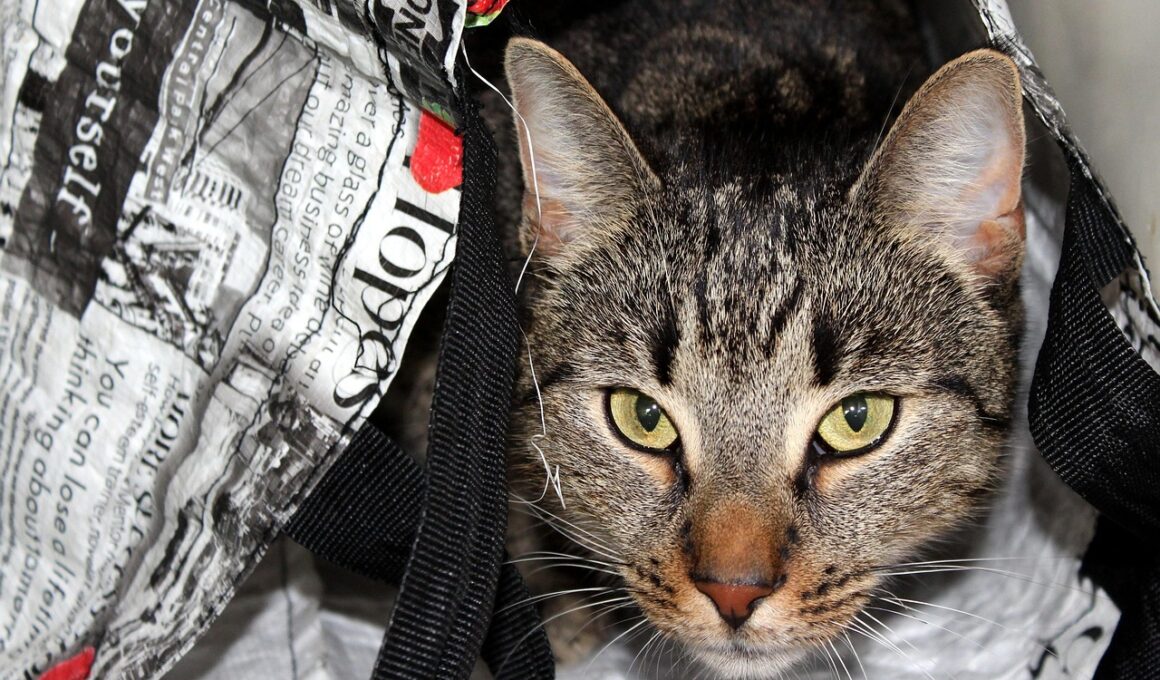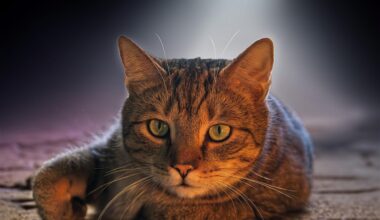The Importance of Safe Hiding Spaces for Anxious Senior Cats
As cats age, they often become more anxious due to various factors including health issues, changes in their environment, or even just the passage of time. Providing a safe hiding space can have a significant impact on your senior cat’s well-being. Cats are naturally inclined to seek out small, enclosed areas where they can feel secure and protected. These spaces not only give them a retreat but also encourage them to express their natural behaviors without fear. Common anxiety triggers for senior cats may include loud noises or unfamiliar visitors. By offering a designated, comfortable place to retreat, you can help alleviate some of these stressors. Consider spaces like a cozy cat bed placed in a quiet corner or a designated cat condo designed for privacy. Another option is to create a hideaway using cardboard boxes or blankets, which allows senior cats to retreat while still being part of their household. Furthermore, securing a calm environment is key; ensure that their hidings spots remain undisturbed and peaceful, promoting relaxation and contentment. These small adjustments can drastically improve the quality of life for your beloved senior feline.
In addition to providing a specific hiding space, it’s essential to consider the overall environment of your home. Cats are sensitive creatures, and any disruption can lead to heightened anxiety. Maintaining a calm atmosphere will help your senior cat feel more secure. Limit interactions with them during high-stress situations, such as loud parties or fireworks. Instead, present their safe space as a serene spot where they can retreat whenever they feel overwhelmed. It’s beneficial to create a routine around feeding and playtime, as predictability can work wonders in easing anxiety for anxious senior cats. Use gentle voices while interacting, and make sure to engage them with toys they enjoy. Additionally, enrichment activities such as puzzle toys can keep their minds occupied, reducing anxiety caused by boredom. Consider diffusing calming pheromones or playing soft music to enhance this peaceful ambiance. When cats feel unthreatened and entertained, they are less likely to seek hiding places unnecessarily. Be mindful of any signals your cat displays, and provide appropriate adjustments based on their behavior. Creating a supportive atmosphere can yield immense benefits for their mental well-being.
Understanding Cat Anxiety
Recognizing the signs of anxiety in senior cats is crucial for effective intervention. Unlike their younger counterparts, older cats may exhibit more subtle behavioral changes when feeling anxious. Look for signs such as excessive grooming, changes in eating habits, or hiding more frequently than usual. Understanding these indicators can help you promote a more supportive environment. While some cats may vocalize their discomfort more than others, others may withdraw completely. Knowing your cat’s normal behavior will help you spot deviations more effectively. When you notice changes, observe the environment for possible stressors, such as new pets or rearranged furniture. Consider staging stress reduction interventions proactively. Essential oils or sprays designed for cats can sometimes ease their jitters, but consult with your veterinarian before use. Knowing the appropriate measures to help them adapt will ensure your senior feline remains comfortable. Keep in mind that patience, love, and understanding go a long way in reducing anxiety. Establishing that all-important safe space will significantly aid in keeping your anxious senior cat calm while navigating life’s changes.
Moreover, providing multiple safe hiding spaces throughout your home can significantly benefit your senior cat. Different locations allow them the freedom to choose a place that feels secure based on their mood. Preferences can shift, so offering variety is essential. Consider placing cat trees near windows for a view of the outside world, allowing them to observe without feeling vulnerable. Small, enclosed beds can also serve as cozy retreats. Make sure these spaces are easily accessible, especially for senior cats who may have mobility issues. Use soft, inviting materials within these spaces to encourage comfort. Regularly rotate hiding spots or change bedding to keep the environment fresh and stimulating. Cats enjoy having control over their environment, and offering options will let them dictate where they choose to hide and feel safe. In addition, monitor their access to safe spaces during stressful times to ensure that they can retreat whenever necessary. This strategy promotes independence while providing comfort, giving your senior feline the control they need in anxious situations.
Creating a Calming Environment
Enhancing your home to create a calming environment is crucial for reducing anxiety in senior cats. The sensory inputs from their surroundings can have a profound impact on their mood. Start by minimizing noise levels; use carpets or other textiles to absorb sound. Senior cats are sensitive to harsh noises and disruptive activity; calming soundscapes or gentle music can provide further relaxation. Dimming lights can also help reduce anxiety, so ensure their favorite retreat has softer lighting when possible. Another effective calming strategy is to ensure that your cat’s essential resources—food, water, litter box—are conveniently located near their hiding spaces. This minimizes stress, allowing them to feel safe while fulfilling their basic needs. Additionally, you may want to rotate toys periodically to keep their interest alive, providing mental stimulation. Keep in mind that fresh air can also work wonders; if the weather permits, consider an enclosed outdoor area where they can enjoy the sights and sounds without fear. All these small changes can foster tranquility while improving the overall quality of life for your senior cat.
Consistency plays a vital role in further establishing a nurturing environment for your senior cat. If they are used to a particular routine, sudden changes can introduce more stress than expected. Maintaining regular feeding times and incorporating play sessions can make the transition smoother during stressful periods. Pay close attention to their favorite hiding spots and ensure they are consistently available. Keeping their access to comforting spaces unaltered will aid in empowering them to navigate anxiety more effectively. When they recognize that their haven is always there, they feel more secure. Likewise, try to avoid changing the layouts of their surroundings drastically. Frequent arrangements of their environment could cause anxiety, so consistency provides stability. Always reassure your senior cat with gentle touch and familiar sounds to bolster their confidence. Sticking to routines and favorite spaces instills a sense of safety, further mitigating anxiety. It allows your beloved feline to enjoy their golden years filled with love, comfort, and tranquility. Allow the bond you share to serve as a source of support during these aging transitions.
Conclusion: Supporting Your Senior Cat
Ultimately, taking care of an anxious senior cat requires understanding, patience, and thoughtful efforts. Fostering a safe, nurturing environment significantly influences their overall well-being. Providing ample safe hiding spaces is one of the strategies that can create a sense of security and comfort. Remember to regularly evaluate their behavior for signs of anxiety and adjust your approach as needed. Every cat is unique, so accommodate their individual needs to ensure their comfort and well-being. Consistency in their environment, combined with enriching activities, will lead to a calmer disposition over time. As you navigate your senior cat’s changing needs, prioritize love and devotion over everything else. Keep those safe spaces clean, inviting, and readily accessible at all times. Ultimately, your care and consideration will enable your cherished companion to enjoy their later years with less anxiety and more happiness. These simple adjustments serve to bolster the bond between you and your cat, transforming their anxiety into peace and security. Commit to addressing their fears patiently, and watch them thrive in a supportive atmosphere.
If you find that your senior cat’s anxiety persists despite your efforts, don’t hesitate to consult a veterinarian or animal behaviorist. Sometimes anxiety in older cats stems from underlying health problems that require professional intervention. Stay vigilant in observing your senior cat’s behavior, and reach out for assistance if needed. Working with professionals can provide you with valuable insights and strategies tailored specifically to your cat’s needs, ensuring their anxiety is adequately addressed. By taking a proactive approach, you can have a more comprehensive understanding of your cat’s emotional and physical health, leading to a happier, healthier life. Ultimately, you want your senior cat to feel secure and loved, providing them with the best quality of life possible. Remember, you’re not alone in this journey; many cat owners face similar challenges and can offer support. By sharing experiences and tips, a community of support can make the journey easier. Your commitment to your cat’s emotional and mental well-being will go a long way toward ensuring they enjoy their golden years with comfort and contentment.


